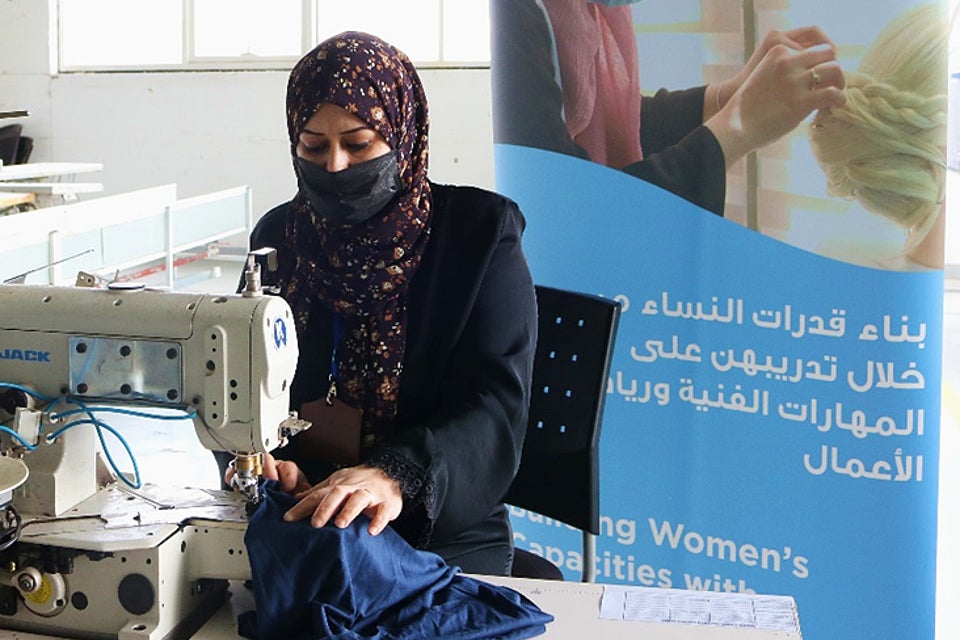A thread of hope: Garment skill development training empowers vulnerable women in Jordan
Date:

Raghad Al-Momani, a hard-working, 40-year-old mother of two, became the breadwinner for her family after her husband became visually impaired in an accident a few years ago. She worked as an office administrator at a kindergarten for six years. But when COVID-19 hit, she lost her job.
Despite many hardships, she started searching for another job, which was difficult since she hadn’t finished high school. That’s when she heard from her friends about the garment training programme being implemented by Education for Employment-Jordan (EFE-Jordan) in partnership with UN Women, funded by the European Union Trust Fund ‘Madad’ in Jordan.
Raghad enrolled in October of 2021 in the training program. She was enthusiastic not only because it was an opportunity to increase her skills and chances of employability, but also because she saw the industrial garment field as an easy and stable source of employment with set working hours and high popularity among women.
Once the training began, she was thrilled to learn work and life skills, such as communication and problem-solving, which she says have helped her grow personally.
“I felt empowered during this training. It felt like the first step to becoming financially independent,” says Raghad, adding that she most benefited from a session with a lawyer who outlined participants’ rights as women in the workplace, such as a set salary and working hours, laws against harassment, and more. They also discussed their rights in society – relationship responsibilities, how to stand up against financial abuse, and the importance of being financially independent.
During the two-month-long technical training, Raghad gained tailoring skills, such as sew specific pieces of clothing, correctly thread the needle into the sewing machine and how to work with fabric, after which she says she could work accurately and quickly. Afterwards, EFE-Jordan even secured a job for her as a tailor in the Al-Deen Factory in Ajloun.
“I benefited by becoming employed in the garment field and improving my skills, such as communicating efficiently. A person must learn to work, and I am glad I haven’t given up. I love my job,” says Raghad. “Thank you, UN Women and EFE-Jordan, for this opportunity.”
“Women need to enter the labour market, especially the vocational sector for its importance in developing their experience, generating income and achieving independence,” says Sujood Azzam, Senior Project Coordinator at EFE-Jordan.
Female labour force participation also has a significant role for the society, strengthening social cohesion and improving the Jordanian economy by creating job opportunities and lowering unemployment. Trained youth become active in their communities, refugees blend in better with their society, and women achieve financial independence. Beneficiaries themselves became more confident, and their work reassured their future.
Since October 2021, at least 273 women have graduated from EFE-Jordan employment training under the UN Women’s programme funded by the European Union Trust Fund ‘Madad’.

Another one of these beneficiaries is 20-year-old Eman Al-Momani, who while she had dropped out of high school to start a family, was determined to work and earn her own income.
Following her aspirations, Eman began searching for such opportunities and came across EFE-Jordan’s garment training programme on social media. Like Raghad, she enrolled in October of 2021.
During the training, Eman gained employability and life skills alongside technical knowledge of the garment trade and its equipment. She learned how to communicate more effectively with others, as well as about women’s rights and the impact of women’s work. In the process, she realized the importance of equal opportunities for men and women, and that working would help improve both her social and financial status, which she says encouraged her even more to become financially independent.
Like Raghad, Eman landed a position as a tailor in the Al-Deen Factory in Ajloun after completing the training, and she has been working there for the past four months. Now, she provides for her parents, helps her husband with living expenses, and more.
“Women face many challenges to find a job, so I’m grateful for the opportunity this programme gave me because I can now support myself and my family with my income,” says Eman.